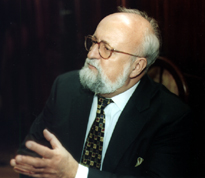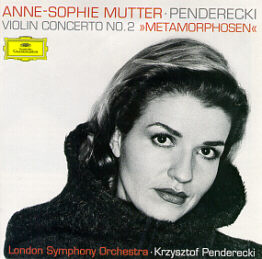
 Krzysztof Penderecki 1-3 April, 2004—New York
Philharmonic
When Krzysztof Penderecki's Violin Concerto No.2, most commonly
known by its original German plural name, Metamorphosen, was
first performed in Leipzig in 1995, it represented a kind of culmination
in one of many distinct phases in a musical life that has from the
beginning been extraordinarily prolific, demonstrated startling
virtuosity, taken surprising twists and turns, been widely celebrated,
criticized, and honored, and proved to be remarkably durable. As composer,
conductor, and teacher all in one, Penderecki has few peers today or even
in the history of music.
Violin Concerto No.2, Metamorphosen Lorin Maazel, Conductor Julian Rachlin, Violin (Debut)  Born 1933 in
Debica, a village east of Cracow, his father a lawyer and enthusiastic
violin player, young Krzysztof was given violin and piano lessons from an
early age. Admitted to the Cracow Conservatory at 18, he simultaneously
studied philosophy, art history, and literature at Jagiellonian
University. From 1954 he studied composition at Cracow's State Academy of
Music, and in 1959, then a still-unknown 28-year-old assistant professor
there, he submitted under different pseudonyms three compositions to the
Composers' Union's second annual Warsaw Competition of Young Polish
Composers, and won the first, second and third prizes. Other works that
followed in rapid succession immediately put Penderecki at the forefront
of the avant-garde with a passionate radical humanism expressed through
his highly experimental and expressionistic use of sound that threw the
academic rules out the window, as in Threnody for the Victims of
Hiroshima, 1960, still perhaps his most widely known and frequently
performed piece.
A second phase followed—one of "consolidation" (as explained, for
example, by Wolfram Schwinger)—in which Penderecki integrated the
experimental and the traditional, as in his Passion According to St.
Luke, 1966, considered by many to be his masterpiece, drawing upon
both Gregorian chant and twelve-tone technique.
In the mid-seventies Penderecki suddenly gave up his avant-garde
interests in favor of the more traditional tonal language of the late 19th
and early 20th century, moving toward a contemporary neo-Romanticism, as
in his first Violin Concerto (1976-77), until yet a fourth phase was
introduced in 1982 with his second Viola Concerto, Born 1933 in
Debica, a village east of Cracow, his father a lawyer and enthusiastic
violin player, young Krzysztof was given violin and piano lessons from an
early age. Admitted to the Cracow Conservatory at 18, he simultaneously
studied philosophy, art history, and literature at Jagiellonian
University. From 1954 he studied composition at Cracow's State Academy of
Music, and in 1959, then a still-unknown 28-year-old assistant professor
there, he submitted under different pseudonyms three compositions to the
Composers' Union's second annual Warsaw Competition of Young Polish
Composers, and won the first, second and third prizes. Other works that
followed in rapid succession immediately put Penderecki at the forefront
of the avant-garde with a passionate radical humanism expressed through
his highly experimental and expressionistic use of sound that threw the
academic rules out the window, as in Threnody for the Victims of
Hiroshima, 1960, still perhaps his most widely known and frequently
performed piece.
A second phase followed—one of "consolidation" (as explained, for
example, by Wolfram Schwinger)—in which Penderecki integrated the
experimental and the traditional, as in his Passion According to St.
Luke, 1966, considered by many to be his masterpiece, drawing upon
both Gregorian chant and twelve-tone technique.
In the mid-seventies Penderecki suddenly gave up his avant-garde
interests in favor of the more traditional tonal language of the late 19th
and early 20th century, moving toward a contemporary neo-Romanticism, as
in his first Violin Concerto (1976-77), until yet a fourth phase was
introduced in 1982 with his second Viola Concerto,  in which he re-introduced to
his romantic idiom the once-shocking musical effects of his early
experimental period, thereafter proceeding to experiment even further. It
was in this newly fertile period, two decades after the first Violin
Concerto, that he composed between 1992 and 1995 the
Metamorphosen, his Violin Concerto No.2, commissioned by the
Mitteldeutsche Rundfunk, Leipzig, and dedicated to the First Violinist at
its 1995 premiere in Leipzig, Anne-Sophie Mutter. On that occasion the
piece, with Penderecki's characteristic symphonic variations upon a single
theme, ran 37 minutes. More recent compositions include a Piano Concerto
commissioned by and performed at Carnegie Hall in 2002.
Mr. Penderecki also established a reputation as a musical dramatist
with four highly successful operas between 1969 and 1991—The Devils of
Loudon (based on the book by Aldous Huxley), Paradise Lost
(from John Milton), The Black Mask (from a play by Gerhardt
Hauptmann), and Ubu Roi (from the play by Alfred Jarry). Like
other leading composers of our century, Penderecki has also built an
international reputation as a conductor, appearing with the leading
symphony orchestras of Europe and America, including the New York
Philharmonic and the Philadelphia Orchestra, among many others. He also
holds permanent posts as principal guest conductor of the NDR Orchestra in
Hamburg and music director of the Casals Festival in Puerto Rico.
While director of his alma mater, the Cracow Academy of Music, from
1972 to 1979, Penderecki had also managed to teach at Yale University from
1973 to 1978, and has since held teaching posts throughout Europe and the
U.S. He has received most of the world's most distinguished awards for
composition, as well as a Grammy Award and two Emmies. He has received
honorary doctorates, memberships, and professorships from numerous
universities and national academies of music, from Stockholm to Buenos
Aires, from Beijing to Pittsburgh . in which he re-introduced to
his romantic idiom the once-shocking musical effects of his early
experimental period, thereafter proceeding to experiment even further. It
was in this newly fertile period, two decades after the first Violin
Concerto, that he composed between 1992 and 1995 the
Metamorphosen, his Violin Concerto No.2, commissioned by the
Mitteldeutsche Rundfunk, Leipzig, and dedicated to the First Violinist at
its 1995 premiere in Leipzig, Anne-Sophie Mutter. On that occasion the
piece, with Penderecki's characteristic symphonic variations upon a single
theme, ran 37 minutes. More recent compositions include a Piano Concerto
commissioned by and performed at Carnegie Hall in 2002.
Mr. Penderecki also established a reputation as a musical dramatist
with four highly successful operas between 1969 and 1991—The Devils of
Loudon (based on the book by Aldous Huxley), Paradise Lost
(from John Milton), The Black Mask (from a play by Gerhardt
Hauptmann), and Ubu Roi (from the play by Alfred Jarry). Like
other leading composers of our century, Penderecki has also built an
international reputation as a conductor, appearing with the leading
symphony orchestras of Europe and America, including the New York
Philharmonic and the Philadelphia Orchestra, among many others. He also
holds permanent posts as principal guest conductor of the NDR Orchestra in
Hamburg and music director of the Casals Festival in Puerto Rico.
While director of his alma mater, the Cracow Academy of Music, from
1972 to 1979, Penderecki had also managed to teach at Yale University from
1973 to 1978, and has since held teaching posts throughout Europe and the
U.S. He has received most of the world's most distinguished awards for
composition, as well as a Grammy Award and two Emmies. He has received
honorary doctorates, memberships, and professorships from numerous
universities and national academies of music, from Stockholm to Buenos
Aires, from Beijing to Pittsburgh .
http://www.polishculture-nyc.org/index.htm. |
| Info-Poland a clearinghouse of information about Poland, Polish Universities, Polish Studies, etc. |